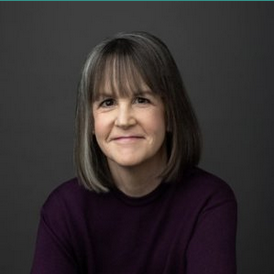Laura Spence-Ash is the author of the new historical novel Beyond That, the Sea. Hew work has appeared in a variety of publications, including New England Review. She lives in New Jersey.
Q: You’ve said that you read a New York Times article in 1998 about older British adults who returned to the United States to see where they had lived during World War II when they were evacuated out of Britain. Can you say more about that?
A: I wasn’t writing at the time, but I was fascinated, and I read everything I could find on the subject. When I read a memoir by a man who had been sent to a town south of Boston, I learned, completely coincidentally, that he and his brother had been sent to the same town where I went to high school.
In fact, we went to the same school—he was there as a day student and I was there as a boarder. Of course, our experiences were vastly different from one another, but I knew what it felt like to be in that place, so far from home. Everything else grew out of that setting.
I found that the cast of characters grew organically from the place. As I find often happens with my writing, characters begin somewhat two-dimensionally but over time and through many drafts, they become more and more nuanced and complicated. I’m far more interested in characters than I am in plot, so that is always the focus for me—they should feel like real people, with everything that entails.
Q: How was the novel's title chosen, and what does it signify for you?
A: The title is from a sentence in The Waves by Virginia Woolf: “In the beginning, there was the nursery, with windows opening on to a garden, and beyond that the sea.” I have long loved that quote: to me, it’s the definition of a life and how it unfurls. For each of the characters in the novel, we see their lives unfolding over a large swath of time, so it felt like the right title.
And, of course, the sea is important to the novel as it’s the big thing that separates the two families and keeps characters apart.
Q: How did you research the book, and did you learn anything that especially surprised you?
A: I did a fair bit of research early on about the Blitz, but I soon realized that I would never actually write the book if I kept doing research. I do think that I write literary fiction that’s set in the past, rather than historical fiction. For me, the characters are in the foreground.
So I began writing, moving chronologically from the beginning to the end, and I would do a deep dive to ground myself when I reached a new moment in time. I did have the opportunity to visit London, and I spent time in the Imperial War Museum, which was fascinating and a great way to learn about domestic life in London during the Blitz.
Several of the characters play postal chess, sending moves back and forth across the Atlantic, and in my research I learned that during the war, cards were redacted or destroyed, and as soon as I read that, I knew that I would need to include that in the book.
And not really a surprise, but it was fascinating to learn more about rationing in the US—as I was completing the final draft, my sister-in-law found ration books that had belonged to her mother and grandfather, including a letter that gave them permission to drive to upstate New York. While I was aware of the rations in England, I hadn’t realized the extent to which rations played a part in the US.
Q: The Publishers Weekly review of the novel says, in part, “Spence-Ash generates a stronger emotional charge with her contrasting portrayals of the two families, whose cultural and economic differences make it difficult for Bea to find her own way.” What do you think of that description, which relates to your character Bea’s two families, one in England and one in the United States?
A: I like the focus on the two families. It took me a long time to understand that this book was really about family. For years, I worked on it thinking that Bea was the main character—and she is the spine of the book—but in the end, I think it really is a book that is primarily interested in exploring family.
Initially, Bea was the only narrator but the book began to work when I included the points-of-view of all eight family members. And I do think that Bea is stuck between the two families, never clear where she belongs. I’m not sure that it’s their cultural and economic differences that cause Bea to be unsure of her identity, though. I think it’s more a matter of her emotional attachment to the Gregorys.
Q: What are you working on now?
A: While I was in my MFA from 2014-2016, I wrote a number of short stories. Three of those stories had characters that I loved and haven’t been able to stop thinking about. The characters weren’t connected in the stories, but I’ve connected them now, and I’m working on telling their overlapping stories.
They are employer and employee; they are mother and daughter; their lives span the 20th century. They are all women, on the outside looking in, trying to find a better way to be. It is fascinating to juxtapose their stories, to see how lives changed for women in the 20th century but also how things often stayed the same.
Q: Anything else we should know?
A: I don’t think so! Thanks so much for this opportunity to answer these questions!
--Interview with Deborah Kalb


No comments:
Post a Comment